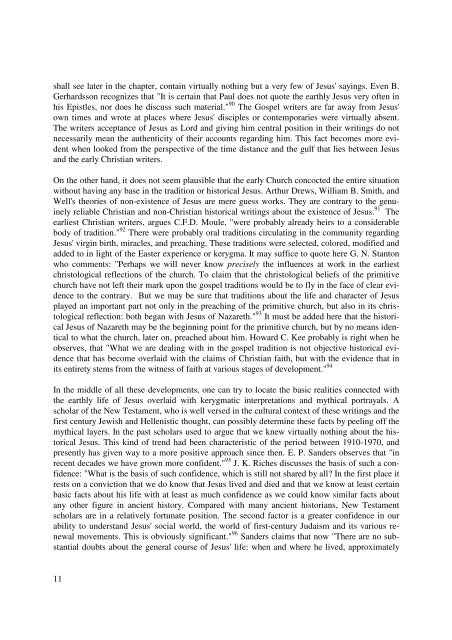Scripture and God in Christianity
Scripture and God in Christianity
Scripture and God in Christianity
Create successful ePaper yourself
Turn your PDF publications into a flip-book with our unique Google optimized e-Paper software.
shall see later <strong>in</strong> the chapter, conta<strong>in</strong> virtually noth<strong>in</strong>g but a very few of Jesus' say<strong>in</strong>gs. Even B.<br />
Gerhardsson recognizes that "It is certa<strong>in</strong> that Paul does not quote the earthly Jesus very often <strong>in</strong><br />
his Epistles, nor does he discuss such material." 90 The Gospel writers are far away from Jesus'<br />
own times <strong>and</strong> wrote at places where Jesus' disciples or contemporaries were virtually absent.<br />
The writers acceptance of Jesus as Lord <strong>and</strong> giv<strong>in</strong>g him central position <strong>in</strong> their writ<strong>in</strong>gs do not<br />
necessarily mean the authenticity of their accounts regard<strong>in</strong>g him. This fact becomes more evident<br />
when looked from the perspective of the time distance <strong>and</strong> the gulf that lies between Jesus<br />
<strong>and</strong> the early Christian writers.<br />
On the other h<strong>and</strong>, it does not seem plausible that the early Church concocted the entire situation<br />
without hav<strong>in</strong>g any base <strong>in</strong> the tradition or historical Jesus. Arthur Drews, William B. Smith, <strong>and</strong><br />
Well's theories of non-existence of Jesus are mere guess works. They are contrary to the genu<strong>in</strong>ely<br />
reliable Christian <strong>and</strong> non-Christian historical writ<strong>in</strong>gs about the existence of Jesus. 91 The<br />
earliest Christian writers, argues C.F.D. Moule, "were probably already heirs to a considerable<br />
body of tradition." 92 There were probably oral traditions circulat<strong>in</strong>g <strong>in</strong> the community regard<strong>in</strong>g<br />
Jesus' virg<strong>in</strong> birth, miracles, <strong>and</strong> preach<strong>in</strong>g. These traditions were selected, colored, modified <strong>and</strong><br />
added to <strong>in</strong> light of the Easter experience or kerygma. It may suffice to quote here G. N. Stanton<br />
who comments: "Perhaps we will never know precisely the <strong>in</strong>fluences at work <strong>in</strong> the earliest<br />
christological reflections of the church. To claim that the christological beliefs of the primitive<br />
church have not left their mark upon the gospel traditions would be to fly <strong>in</strong> the face of clear evidence<br />
to the contrary. But we may be sure that traditions about the life <strong>and</strong> character of Jesus<br />
played an important part not only <strong>in</strong> the preach<strong>in</strong>g of the primitive church, but also <strong>in</strong> its christological<br />
reflection: both began with Jesus of Nazareth." 93 It must be added here that the historical<br />
Jesus of Nazareth may be the beg<strong>in</strong>n<strong>in</strong>g po<strong>in</strong>t for the primitive church, but by no means identical<br />
to what the church, later on, preached about him. Howard C. Kee probably is right when he<br />
observes, that "What we are deal<strong>in</strong>g with <strong>in</strong> the gospel tradition is not objective historical evidence<br />
that has become overlaid with the claims of Christian faith, but with the evidence that <strong>in</strong><br />
its entirety stems from the witness of faith at various stages of development." 94<br />
In the middle of all these developments, one can try to locate the basic realities connected with<br />
the earthly life of Jesus overlaid with kerygmatic <strong>in</strong>terpretations <strong>and</strong> mythical portrayals. A<br />
scholar of the New Testament, who is well versed <strong>in</strong> the cultural context of these writ<strong>in</strong>gs <strong>and</strong> the<br />
first century Jewish <strong>and</strong> Hellenistic thought, can possibly determ<strong>in</strong>e these facts by peel<strong>in</strong>g off the<br />
mythical layers. In the past scholars used to argue that we knew virtually noth<strong>in</strong>g about the historical<br />
Jesus. This k<strong>in</strong>d of trend had been characteristic of the period between 1910-1970, <strong>and</strong><br />
presently has given way to a more positive approach s<strong>in</strong>ce then. E. P. S<strong>and</strong>ers observes that "<strong>in</strong><br />
recent decades we have grown more confident." 95 J. K. Riches discusses the basis of such a confidence:<br />
"What is the basis of such confidence, which is still not shared by all? In the first place it<br />
rests on a conviction that we do know that Jesus lived <strong>and</strong> died <strong>and</strong> that we know at least certa<strong>in</strong><br />
basic facts about his life with at least as much confidence as we could know similar facts about<br />
any other figure <strong>in</strong> ancient history. Compared with many ancient historians, New Testament<br />
scholars are <strong>in</strong> a relatively fortunate position. The second factor is a greater confidence <strong>in</strong> our<br />
ability to underst<strong>and</strong> Jesus' social world, the world of first-century Judaism <strong>and</strong> its various renewal<br />
movements. This is obviously significant." 96 S<strong>and</strong>ers claims that now "There are no substantial<br />
doubts about the general course of Jesus' life: when <strong>and</strong> where he lived, approximately<br />
11
















